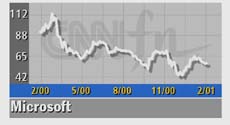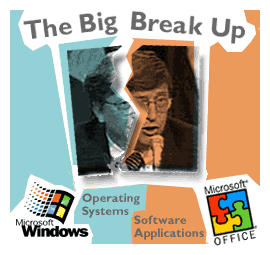|
Judges grill Microsoft, DOJ
|
 |
February 26, 2001: 5:41 p.m. ET
Both sides field harsh questions at outset of antitrust appeal hearing
|
NEW YORK (CNNfn) - Lawyers for Microsoft and the U.S. Justice Department squared off again Monday, and each side faced harsh questioning from a panel of judges presiding over the next phase of the software company's historic antitrust case.
At the outset of the two-day hearing in the U.S. Court of Appeals for the District of Columbia Circuit, at least two out of the seven judges hearing the case sent clear signals that Microsoft faces an uphill battle in its fight to overturn a ruling that the company broke U.S. antitrust laws and should be split in two.
Judge David Tatel told Microsoft attorneys early in the proceedings, "I don't see how you can get a reversal." The Microsoft lawyers are led by Richard Urowsky.
Judge Douglas Ginsburg accused the company of using "saturation bombing" tactics against Netscape, whose "Navigator" Web browser is the main competitor against Microsoft's "Internet Explorer."
 Then, later in the day, the court's chief judge, Harry Edwards, criticized what many legal experts had seen as the strongest part of the government's case against Microsoft. Then, later in the day, the court's chief judge, Harry Edwards, criticized what many legal experts had seen as the strongest part of the government's case against Microsoft.
"You're going to replace one monopoly with another if you're right," he told government lawyers, led by Jeffrey Minear.
When it was over, attorneys from both sides had fielded questions from all seven judges as they began the two-day hearing. The time that the Court has set aside to hear oral arguments in the case is unusually long. Typically, it allows about 30 minutes for oral arguments.
"I think the intriguing thing in the afternoon was the chief judge led the charge [against the government's case] on some of these issues," said William Kovacic, a professor of antitrust law at George Washington University.
The judge's questions "did much more damage to the government than they did to Microsoft," said Robert Lande, a law professor at the University of Baltimore.
At issue is the ruling by Judge Thomas Penfield Jackson that Microsoft abused its monopoly power in the market for personal computer operating systems by integrating its Web browser into Windows to combat a rival browser offered by Netscape. Jackson also ordered that Microsoft split its business into two parts so as to prevent further abuse.
Urowsky argued that Microsoft did not stifle competition or hurt consumers by bundling its Explorer browser with Windows, telling the Court that the government's entire case was undermined by the widespread availability of Netscape's browser.
"Nothing Microsoft did foreclosed Netscape from any portion of the marketplace," Urowsky said.
 Minear also fielded a stream of critical questions from Edwards and Judges Stephen Williams, Raymond Randolph and Douglas Ginsburg about whether the market naturally tended toward a single, dominant standard. Minear also fielded a stream of critical questions from Edwards and Judges Stephen Williams, Raymond Randolph and Douglas Ginsburg about whether the market naturally tended toward a single, dominant standard.
Minear said the government's case was "all about allowing the competitive process to determine who will be the winner in the market." But the chief judge pressed Minear on whether the winner would be a monopoly. "You don't seriously assume that you have competing middleware operations, do you?" Edwards asked.
"I can't say that it's inconceivable that a situation could arise where there would be..." Minear answered before Edwards cut him short with: "You haven't argued that."
On Tuesday, Urowsky is expected to argue that Jackson's decision against Microsoft also was biased.
In interviews with reporters and authors writing books on Microsoft's legal ordeal, Jackson made scathing attacks on company Chairman Bill Gates, Microsoft's legal team as well as the U.S. appeals court, in which the case currently is being heard.
|

|
VIDEO
|
|
 CNNfn's Steve Young reports from Washington on Microsoft's appeal. CNNfn's Steve Young reports from Washington on Microsoft's appeal. |
|
Real
|
28K
|
80K
|
|
Windows Media
|
28K
|
80K
|
|
Many legal analysts believe the Appeals Court, which ruled for Microsoft (MSFT: Research, Estimates) in a related matter in 1998, represents the best chance for the world's largest software company to overturn or substantially weaken Jackson's ruling, which marked the most important antitrust case since the breakup of AT&T (T: Research, Estimates) in 1984.
A softening of the case first brought by the U.S. Justice Department and state attorneys general in May 1998 also could lead antitrust enforcers in the new Bush administration to seek a settlement.
"They [Microsoft] would be more than happy to knock some of the case out and then try to settle with a more sympathetic administration," said Steve Houck, an attorney who represented the New York attorney general's office in the case before leaving for the law firm Reboul MacMurray. "I think that's exactly what the game plan is."
The Justice Department's new antitrust chief, Charles James, has not provided any clues on the case since his appointment, but did stress in a television interview last year that he thought consumers had benefited from the ubiquity of Microsoft's Windows software platform.
Separately Monday, the Wall Street Journal reported that Microsoft is facing federal charges of false and deceptive advertising for the second time in less than a year. The company is negotiating to settle the Federal Trade Commission probe, the newspaper reported, citing lawyers close to the case.
The charges center on Microsoft's aggressive advertising campaign targeting hand-held device maker Palm Inc. (PALM: Research, Estimates), the newspaper said.
Microsoft shares rose $2.81 to $59.56 in Nasdaq trade Monday. The stock has plunged from its 52-week high of $115 in the wake of the antitrust ruling, but shares are up about 27 percent since the beginning of the year amid optimism about the company's prospects under the Bush administration.
-- from staff and wire reports 
|
|
|
|
|
 |

|

